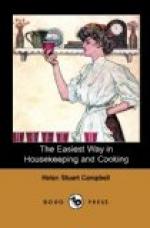The inference is plain. Union is strength, here as elsewhere; and the perfect meal must include as many of these elements as will make it not too bulky, yet borrowing flavor and substance wherever necessary.
As a rule, the food best adapted to climate and constitution seems to have been instinctively decided upon by many nations; and a study of national dishes, and their adaptation to national needs, is curious and interesting. The Esquimaux or Greenlander finds his most desirable meal in a lump of raw blubber, the most condensed form of carbonaceous food being required to preserve life. It is not a perverted taste, but the highest instinct; for in that cruel cold the body must furnish the food on which the keen air draws, and the lamp of life there has a very literal supply.
Take now the other extreme of temperature,—the East Indies, China, Africa, and part even of the West Indies and America,—and you find rice the universal food. There is very little call, as you may judge, for heat-producers, but rather for flesh-formers; and starch and sugar both fulfill this end, the rice being chiefly starch, which turns into sugar under the action of the saliva. Add a little melted butter, the East Indian ghee, or olive-oil used in the West Indies instead, and we have all the elements necessary for life under those conditions.
A few degrees northward, and the same rice is mingled with bits of fish or meat, as in the Turkish pilau, a dish of rice to which mutton or poultry is added.
The wandering Arab finds in his few dates, and handful of parched wheat or maize, the sugar and starch holding all the heat required, while his draught of mare’s or camel’s milk, and his occasional pilau of mutton, give him the various elements which seem sufficient to make him the model of endurance, blitheness, and muscular power. So the Turkish burden-bearers who pick up a two-hundred-pound bag of coffee as one picks up a pebble, use much the same diet, though adding melons and cucumbers, which are eaten as we eat apples.
The noticeable point in the Italian dietary is the universal and profuse use of macaroni. Chestnuts and Indian corn, the meal of which is made into a dish called polenta, something like our mush, are also used, but macaroni is found at every table, noble or peasant’s. No form of wheat presents such condensed nourishment, and it deserves larger space on our own bills of fare than we have ever given it.
In Spain we find the olla podrida, a dish containing, as chief ingredient, the garbanzo or field-pea: it is a rich stew, of fowls or bacon, red peppers, and pease. Red pepper enters into most of the dishes in torrid climates, and there is a good and sufficient reason for this apparent mistake. Intense and long-continued heat weakens the action of the liver, and thus lessens the supply of bile; and red pepper has the power of stimulating the liver, and so assisting digestion. East Indian curries, and the Mexican and Spanish olla, are therefore founded on common-sense.




